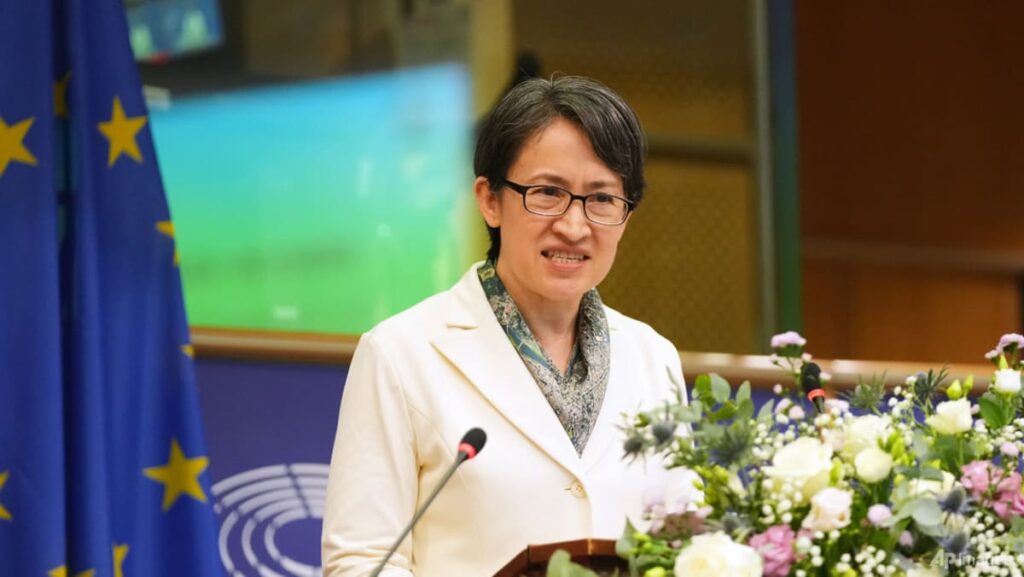BRUSSELS: Taiwan Vice-President Hsiao Bi-khim made an unusual visit to Belgium on Friday (Nov 7) and spoke at a meeting with lawmakers at the European Parliament, part of an increasingly bold outreach to Europe by the Chinese-claimed and democratically governed island.
Taiwan’s only formal diplomatic ties in Europe are with the Vatican, but countries from Britain and France to Lithuania and Poland have disregarded Beijing’s complaints to allow visits by acting or former senior Taiwan officials.
While Taiwan foreign ministers on occasion visit Europe and other parts of the world that have no formal ties to Taipei, it is rare for an official as senior as the vice-president to do so, given the risk of Chinese backlash against the host nation.
Hsiao spoke at the Inter-Parliamentary Alliance on China’s annual summit, held in the European Parliament in Brussels.
Hsiao said stability across the Taiwan Strait was a cornerstone of global prosperity.
“Peace in the Taiwan Strait is essential to global stability and economic continuity, and international opposition against unilateral changes to the status quo by force cannot be overstated,” she said.
“In an era marked by increasing fragmentation, volatility and rising authoritarianism, this gathering affirms something vital — that democracies, even when far apart, are not alone,” she added to a standing ovation in a small chamber of the European Parliament.
While Hsiao did not formally address the whole European Parliament — the European Union trade bloc does not have formal diplomatic relations with Taiwan — her visit still drew ire from Beijing.
China’s mission to the European Union said in a press briefing on Saturday that Hsiao’s visit “gravely violates the one-China principle, constitutes serious interference in China’s internal affairs, and severely undermines political mutual trust between China and the EU”.
Taiwan’s government says it has the right to engage with other countries and that China has no right to claim the island or to dictate Taipei’s actions.
Taiwan’s presidential office said Hsiao, a fluent English speaker who was previously the de facto ambassador to the United States, was accompanied by Taiwan Foreign Minister Lin Chia-lung.
Hsiao also drew parallels between Taiwan suffering cyberattacks and having its undersea internet cables cut by China, and hybrid attacks faced by European nations since Russia’s invasion of Ukraine.
“Europe has defended freedom under fire. And Taiwan has defended democracy under pressure,” the Inter-Parliamentary Alliance on China quoted Hsiao as telling the meeting.
“I stand here as a voice for a society deeply committed to the ideals that animate the parliaments of democracy around the world,” she added.
“Despite being excluded from international organisations, Taiwan has stepped up. We contribute to humanitarian aid. We uphold global standards even when we are not allowed a seat at the table.”
The Inter-Parliamentary Alliance on China is a global group of hundreds of lawmakers who want to strengthen coordination on China-related policy and lobby for unified international action on key China challenges.
Some 50 lawmakers from about two dozen countries attended Friday’s event in Brussels.
Hsiao’s trip and speech were kept under wraps because of high security concerns after reports that Chinese agents plotted to ram her car during her visit to the Czech Republic in March 2024, when she was vice president-elect. Czech officials later said Chinese agents had followed Hsiao and planned to intimidate her physically.
Hsiao said at the time that the Chinese Communist Party’s “unlawful activities” will not intimidate her from “voicing Taiwan’s interests in the international community.”
Besides Hsiao’s Brussels trip, former Taiwan President Tsai Ing-wen is also schedule to visit Berlin to address a conference next week.
In September, Lin travelled twice to Europe, visiting Austria, the Czech Republic, Poland and Italy.
Speaking to reporters in Taipei this week, Lin said that he went to Europe to strengthen relations and that his ministry had set up a Europe task force.
China routinely states that Taiwan’s independence is a “dead end” and that annexation by Beijing is inevitable. China’s military has increased its encircling of Taiwan’s skies and waters in recent years, holding joint drills with its warships and fighter jets on a near-daily basis near the island.
Last month, Taiwan’s President Lai Ching-te vowed to accelerate the building of the air defence system “T-Dome,” or Taiwan Dome, and boost defense spending to reach 5 per cent of Taiwan’s GDP by 2030 amid growing security concerns.
China and Taiwan split during a civil war that brought the Communist Party to power in China in 1949. The defeated Nationalist Party forces fled to Taiwan, where they set up their own government.
Read the full article here

